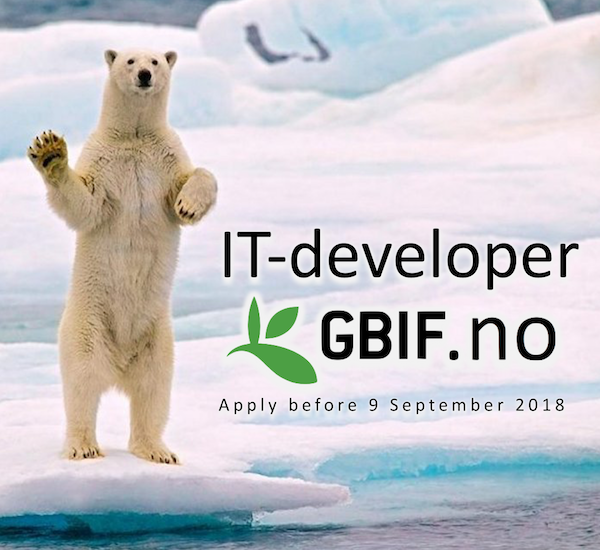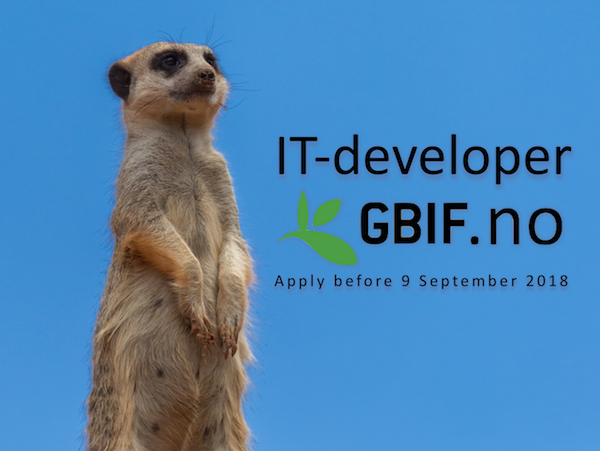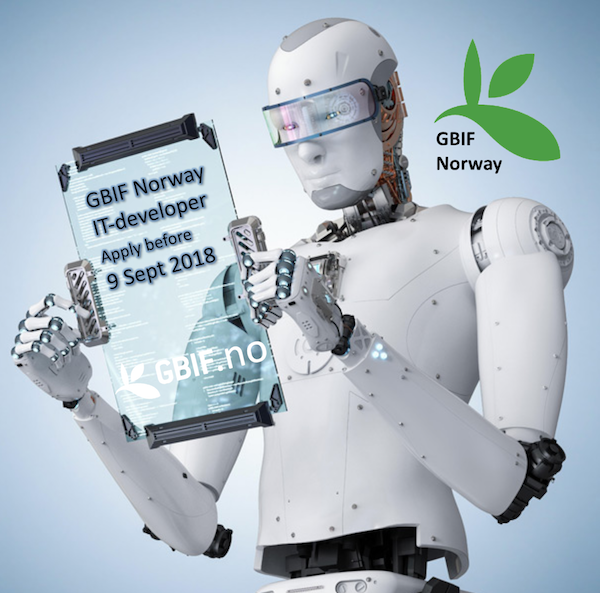About the position
Vacancy at the Natural History Museum (NHM), University of Oslo for a temporary position until 31. December 2019 as head engineer with competences in open publication of biological research-data and software-development. The position belongs to the Norwegian participant node of the Global Biodiversity Information Facility (GBIF) and to the museum research group for Geo-ecology (GEco). The research department of the museum is responsible for the scientific collections of natural history at the museum, for education, student supervision, communication to the general public, basic research and applied research within the topics covered by the museum mandate.
Global Biodiversity Information Facility (GBIF) is an international organization working for standardized and open access to biodiversity information and research data freely available online to anybody anytime. GBIF was established in 2001 after a motion in the OECD in 1999. Norway joined GBIF as a member in 2004 and the Norwegian GBIF participant node is located at the museum since its establishment in 2005. GBIF Norway delivers a national research infrastructure and facilitates the publishing of biodiversity data from more than 30 Norwegian data-nodes and more than 200 databases in Norway. The museum maintains a particular close collaboration with the Norwegian Biodiversity Information Center (NBIC; Artsdatabanken) in Trondheim for the national Norwegian participation in GBIF, operation of the Norwegian GBIF participant node and the dataflow for biodiversity information to the Norwegian Species Map Service (Artskart).
Work tasks
The GBIF Norway developer has the operational responsibility for the Norwegian GBIF helpdesk with focus on support for Norwegian data-nodes, institutions and researchers with implementation of open international publication of primary biodiversity information and biodiversity research data in Norway. The position will also include some software development with particular focus on wide international collaboration on joint solutions together with developers at GBIF participant nodes in other countries. Some travel activity in Norway and internationally will be required.
The position includes a wide variation of tasks. A major part of the duties will be to provide technical support to Norwegian researchers and students, teaching at workshops and courses on biodiversity informatics and open data publication. Other tasks include maintaining and updating the online home page for GBIF Norway and contribution to the development of international solutions for open publication of primary biodiversity information. The scope of GBIF includes biodiversity data from all organism-groups and from all ecosystems (terrestrial, limnic and marine) and from all global geographical localities. GBIF delivers a global research infrastructure which enable the most complete and widely utilized knowledgebase on biodiversity information both globally and nationally in Norway. Responsibilities for national communication and facilitation of biodiversity information within Norway is organized in a particular close collaboration with the Norwegian Species Information Center (NBIC; Artsdatabanken).

Qualifications
- A background in natural sciences with a Master degree (MSc) in informatics, computer programming or alternatively in biology or similar with work experience with informatics and management of research data.
- Particular good collaboration skills and willingness to work in a decentralized international team to deliver technical support-services.
- Experience with open source software development, preferably in a Linux/Unix server environment using Git for version control (e.g. GitHub, GitLab or similar).
- Interest and capability to learn coding with the most relevant coding languages used in the GBIF community (Java, Python, Perl, Ruby, JavaScript, etc.).
- Experience with relational databases (PostgreSQL med PostGIS, or similar).
- Capability and willingness to contribute to workshops and training courses organized by GBIF and by GBIF Norway.
- Good written and verbal communication skills, in both Norwegian and English.
The following skills will be considered as an advantage:
- Experience with and/or good understanding of digital biodiversity information and information systems.
- Knowledge of the most common international standards and protocols for data exchange, publication and archiving of biodiversity data, including Darwin Core and other standards endorsed or ratified by Biodiversity Information Standards (TDWG).
- Experience with preparation and open publication of biodiversity data in GBIF or similar communication and open publication of research data.
- Experience with metadata standards and formats for describing datasets (GBIF uses the Ecological Metadata Language, EML, to describe datasets).
- Experience with Elasticsearch or similar for search optimization across datasets with Norwegian biodiversity data.
- Experience with solutions for storage and efficient management of big data volumes (e.g. Hadoop or similar).
- Experience with the implementation of globally unique identifier keys (e.g. UUID, DOI or similar).
- Experience with JSON-LD, RDF or similar data exchange formats which can contribute to interoperability between different data types.
- Experience with Docker or similar for virtualizing server systems and Docker Hub for collaboration with developers at national GBIF participant nodes in other countries.
- Willingness and skills for working in a dynamic international research community.
- It is also an advantage, but not a requirement, that the applicant have a basic knowledge of Norwegian nature and biodiversity.
Evaluation of the candidates
The evaluation of candidates to the position will focus on the width and depth of the knowledge and experience relevant to the responsibilities of the position. The final evaluation of applicants to the position will assess formal qualifications, personal skills and suitability for the position.
An important objective of the position is to secure a long-term establishment of knowledge and skills for open international publication of digital biodiversity data in Norway. The position is primarily recruited as head engineer (SKO 1087). Recruitment as senior engineer (SKO 1181) is possible for candidates that meet the competence requirements.
Recruitment procedures and employment conditions are regulated by the personnel regulations at the University of Oslo (Norwegian website).
We offer
- Salary depending of skills and documented qualifications as head engineer SKO 1087 (kr 480 600 - 576 100 NOK). For particularly qualified applicants the code SKO 1181 senior engineer and higher salary can be considered.
- An inspiring and professionally stimulating working environment in a cross-disciplinary international team.
- Favorable pension arrangement with Statens pensjonskasse.
- Attractive welfare arrangements.
Application must include
- Application letter with information about education; employment history; technical and (if applicable) pedagogical experience as well as experience with administrative helpdesk tasks. We also request applicants to include a brief description of experience and active participation in open source software development and experience within biodiversity informatics and open publication of research data.
- CV
- Preferably as PDF-documents. The application can be written in either English or Norwegian.
- Applications must be submitted electronically before 9 September 2018 through Jobbnorge.
Contact information
- Dag Endresen, GBIF Norway node manager, email: dag.endresen@nhm.uio.no, phone: +47 22851654
- David Ulleland, section for human resources at NHM, email: david.ulleland@nhm.uio.no, telephone: +47 22845845
About the University of Oslo

The University of Oslo is Norway’s oldest and highest ranked educational and research institution, with 28 000 students and 7000 employees. With its broad range of academic disciplines and internationally recognised research communities, UiO is an important contributor to society.
The Natural History Museum at the University of Oslo is Norway’s most comprehensive natural history collection. For almost 200 years, preserved plant specimens, animal specimens, rocks, minerals and fossils have been collected, studied and preserved here. The museum is located at Økern and in the beautiful Botanical Garden at the university campus Tøyen, which is not only popular for recreation, but is a scientific collection in itself.
| Deadline was | 9 September 2018 |
|---|---|
| Employer | University of Oslo |
| Scope | Fulltime |
| Duration | Temporary |
| Place of service | University campus Tøyen in Oslo |













